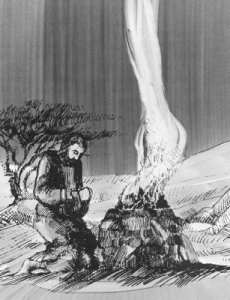 I recently came across a short devotional on the Abraham and Isaac story. You know the one:
I recently came across a short devotional on the Abraham and Isaac story. You know the one:
God tells Abraham to take his only son up a mountain and burn him on an altar. God ultimately spares Isaac and never intended him to actually die. It’s a harrowing scene nonetheless, and one that many unbelievers cite as a reason for rejecting God.
I’m not going to attempt an apologetic here. What I want to explore has to do with the concluding thought from that devotional:
“So make your life an altar to God. Not to get what you want, not to spare something sacred, but to experience the faithfulness of God each day.”
“Make your life an altar” is easy to say and sounds so delightfully simple. But really, how do you do that? Is it an incantation? Say the words “make my life an altar, Lord” and sit back and assume it’s happening?
Is it a program: Ten Ways to Make Your Life an Altar Today? Is it just being Zen, carrying an image of an open hand through your daily life?
I went on a long walk to ponder this.
The dominating struggle in my life the last couple of years is one of vocation. I’m on a kind of working sabbatical right now, trying to ascertain if the issue is burnout or something deeper.
My first thought on this walk: Am I supposed to give up writing? The thing by which I identify myself, the thing I longed and waited and prayed for like Abraham and Sarah longed and waited and prayed for a child.
Am I supposed to bind it, stab it, and watch it burn?
My next thought: Isaac doesn’t actually get sacrificed. The point is willingness, faith. And I am willing. I’ve put writing on the altar before, and I’m more than happy to do it again.
The real question I’ve been asking is if all this angst and fatigue means writing is no longer my calling.
The thought after that: Wait.
It’s clear from the story of Abraham (and all the other stories of calling in the Bible) that something being difficult, at times torturous, isn’t a sign that it’s not what you’re called to.
To grossly understate it, Abraham’s calling to sacrifice Isaac certainly wasn’t fun, easy, or immediately satisfying. How was Abraham’s calling simultaneously about being the father of many nations and about being willing to slaughter that promise with his own hands?
What lesson is to be taken from this? None, perhaps. The scriptures are full of specific stories about specific people that are not meant for universal application.
Yet: Make your life an altar. Make your life an altar.
The phrase clung to me for days, and the idea of calling, of vocation, and all my questions around it seem to me connected to these words.
I’ve been trained, as I think we all have, to think of calling as the perfect fit, the color of my parachute. Doing what I love and watching the money come to mama. If I feel dissonance, I just haven’t yet found my passion.
In my mind’s eye I watch Abraham climb the mountain. Answering his calling. Wondering what the hell he’d done to deserve this misery, and where the whole thing that seemed so good had gone wrong. That’s how I imagine it.
Or maybe his faith in God’s goodness was so strong that he never for one second believed he’d really have to sink the knife into Isaac’s heart.
Here, I laugh at myself for even attempting to draw parallels between my own current tug of war with my vocation and Abraham’s astounding, disturbing obedience. But this is how we’ve been taught, isn’t it?
We get to know God’s character and how he works in the lives of his people by reading the Bible. So I read the story again.
What does it mean to trust God’s character and answer a calling that gives you extreme doubt? The phrase that comes to mind when I look at Abraham’s actions:
Show up and obey.
Lacking a specific directive like Abraham’s, what I think about “show up and obey” is that it looks like this:
Do my work in the job and life I have, the work I’m given. Love the people who are in front of me now. Love God. Love my neighbor. Try not to break the Ten Commandments. When I do (and oh I do), confess and repent. Receive forgiveness and live like a forgiven person. Inhabit what my pastor recently called the “environment of redemption” that believers live in.
I’m inclined to think that what goes on the altar of my life is any expectation I have that my existence would or should be anything other than those things. Some days it will feel good and joyous and effortless. Some days it will feel like trudging up a mountain en route to an odious and dreadful task.
Every day, God provides.











